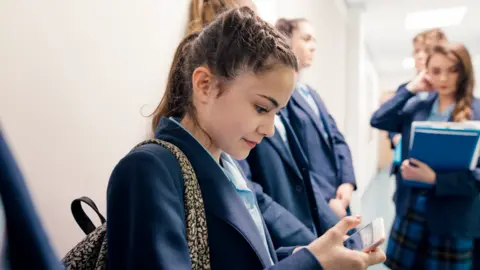In a recent discussion surrounding the ongoing debate over smartphone use in schools, England’s children’s commissioner, Dame Rachel de Souza, asserted that phone bans should be left to individual head teachers rather than mandated by national government directives. This statement follows the findings of a substantial survey conducted across 19,000 schools and colleges, revealing that a significant majority of secondary schools—approximately 90%—have imposed restrictions on smartphone usage among students. The survey indicated that the presence of technology in educational environments raises important questions about its impact on children’s focus and overall learning experiences.
Dame Rachel expressed concern that although mobile phone restrictions are prevalent during school hours, children are compensating for the lack of screen time at school with increased screen hours at home. Many students reportedly spend excessive time on their devices outside of school, which prompted Dame Rachel to call attention to the need for better parental support in overseeing their children’s online activities. Her comments coincided with those made by the general secretary of the UK’s largest teaching union, who opined that a government-enforced ban on phones could relieve some of the burdens currently placed on schools regarding this issue.
The survey results showed that around 99.8% of primary schools and 90% of secondary institutions implement some form of limitation on mobile phone access during academic hours. In primary schools, around 76% require students to either hand over their devices or keep them securely stored throughout the day. Conversely, 79% of secondary schools dictate that phones be kept out of sight and not utilized on school grounds. However, the survey did not assess the effectiveness of these policies or provide insights regarding the actual implementation and adherence rates.
Furthermore, an additional survey of 502 children aged 8 to 15, commissioned by Dame Rachel, revealed concerning trends about screen time. The data indicated that 69% of the surveyed children spend over two hours daily on devices, with 23% admitting to spending more than four hours each day. These figures underscore the reality that while school policies seek to minimize smartphone use, children may engage in extensive screen time within their home environments, raising questions about the broader implications of technology on child welfare and development.
In her assessment, Dame Rachel emphasized that the conversation about screen time transcends school limits. Rather, it encompasses the role of parents and caregivers in managing children’s online engagement and establishing appropriate boundaries. She advocates for an urgent need for educational institutions to uphold clear policies regarding mobile phone usage whilst simultaneously educating students about the risks associated with online interactions.
She specifically stressed that any head teacher wishing to implement a total ban on mobile phones within their institution should receive full support in doing so. However, she firmly believes that such decisions should stem from local insights rather than being dictated by overarching, national mandates. Moreover, Dame Rachel’s report encouraged the government to explore the effects of imposing wider restrictions on young people’s access to smartphones and social media platforms.
In response to Dame Rachel’s statements, a government representative pointed out the existing laws that compel social media platforms to eliminate illegal content and the upcoming Online Safety Act that will ensure further protection for children from harmful digital material. The official reiterated that schools have already been provided with guidance on creating mobile phone restrictions tailored to their specific needs, placing the final decision in the hands of head teachers.
Echoing Dame Rachel’s sentiments, Daniel Kebede, the national secretary of the National Education Union, proposed that a government-wide ban on smartphones in schools would ease pressure on parents and could standardize the approach across educational facilities. He noted the significance of establishing a cohesive and healthy culture surrounding mobile phone usage during school hours, likening the need for regulation in the online space to historical efforts in public health concerning tobacco use.
This ongoing dialogue highlights the complex relationships between technology, education, and child development. As schools grapple with these issues, it is clear that proactive solutions must involve collaboration across families, educational institutions, and policymakers, ensuring that children are protected in an increasingly digital world.











